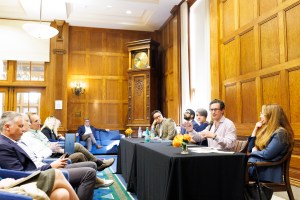Survey shows Americans not panicking over anthrax
But they are starting to take steps to protect themselves against possible bioterrorist attacks
In the wake of biological terror attacks perpetrated by unknown persons sending anthrax-laced letters through the U.S. mail, the Harvard School of Public Health and the Robert Wood Johnson Foundation launched their Survey Project on Americans’ Response to Biological Terrorism. The first report of the ongoing survey, released on Nov. 8, 2001, found that most Americans think they and their families have a relatively low risk of contracting anthrax or smallpox. According to the survey, Americans believe it is far more likely that they or someone in their immediate family will get the flu (73% very or somewhat likely), or be injured in a fall (50%) or automobile accident (41%) during the next 12 months than that they will contract anthrax (14%) or smallpox (9%). The families of postal workers had a different perspective, however. About one-third (32%) of Americans from households where someone works for the U.S. Postal Service believe that they or someone in their family are very or somewhat likely to contract anthrax. And though most Americans think they are at relatively low risk of contracting anthrax or smallpox, a majority (57%) have taken one or more precautions in response to reports of bioterrorism.





